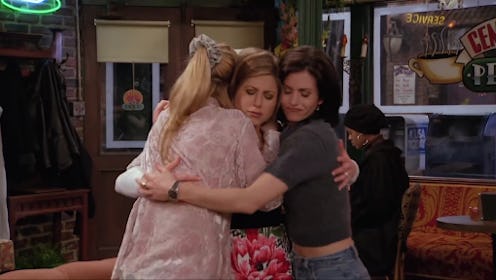Life
What Would A World Without Hugs Look Like? A Pro Cuddler Doesn’t Want To Know

In a world devoid of physical contact, self-professed huggers are dreaming about the days of warm embraces, and wondering what will happen to hugs post-pandemic. Will people immediately run back into each other's arms? Or begin a tradition of awkward but socially responsible elbow taps instead?
According to a survey of 2,000 Americans conducted by OnePoll on behalf of Bustle, hugging is one of the people's main concerns as they navigate a world that's slowly reopening, with 51% of participants admitting that the idea of being pulled in for a hug makes them uneasy.
Over the past few months, the rules of social distancing have been drilled into our minds. Standing six feet apart has become the new normal, and the very idea of hugging may feel like a strange invasion of personal space. Since health experts are still figuring out the best recommendations, it'll probably be a while before we know when it's safe to ease back into casually hugging again, even if it's one of those weird, one-armed side-hugs. (At this point, even that sounds better than nothing.)
I can feel the need for a hug like a physical pain in my chest.
"I'm not [usually] a fan of hugs, but ever since this started, I can feel the need for a hug like a physical pain in my chest," Shelby, 26, tells Bustle.
According to Kat Thomas, a sex expert and professional cuddler, the basic human need for touch was, is, and will always be there. As someone who turned their love of hugs into a profession, she says the job is as much about hugging as it is "holding space for your client," the same way a bartender or hairdresser does. "All these occupations allow their clients to be seen and appreciated," she tells Bustle.
Thomas predicts hugs will come back in full force, especially once a vaccine for coronavirus is found because physical touch is vital to overall well-being. "Cuddling, hugs, and touch, in general, play an important role in helping us be healthy human beings," she says. "From a scientific perspective, cuddling releases oxytocin, aka the 'cuddle hormone.' When this hormone is released into the body, it creates a natural high."
Ever wonder why being in close proximity to another person — or even a cat or dog — feels so good? The interaction is a natural mood lifter, Thomas says, and it even relieves anxiety and strengthens the immune system. That said, it's OK to go without hugs for a few months since keeping your distance during a pandemic will always outweigh the benefit of physical contact.
But even a few months isn't easy for those who rely on hugs to feel good. Paolo, 32, tells Bustle, "I'm definitely a big hugger, and it's been really hard to lie alone. Even in the rare times that I see someone I know, it's just an [elbow] bump, and it's not the same. I miss that connection." Moreover, Thomas says her bookings for in-person cuddle sessions have gone way down during quarantine, per government regulations. It's not only impacting her revenue stream but has also left her feeling lonely.
I got involved in Professional Cuddling because I like interacting people: I like touching them, talking with them, and helping them.
"More than anything else, I really miss people," she says. "I got involved in Professional Cuddling because I like interacting with people: I like touching them, talking with them, and helping them in any way I can."
Luckily, for everyone who feels that pain, there are plenty of other ways to remain connected. Thomas says her clients are still reaching out for other forms of interaction. "I've done phone and Zoom sessions with clients where we chatted, watched a movie, and listened to music," she says, adding these activities provide the aforementioned sense of feeling "seen."
It's not a perfect replacement, but we can all emulate warmth and help each other feel less alone until the day comes when it's possible to enjoy hugs again in all forms, from long cuddles to quick embraces, and everything in between.
Gabrielle Revlock, the founder of the touch-based mindful movement practice Restorative Contact, says she misses teaching dance classes in real life and being a part of a community. But she's a firm believer that hugs will continue to be a part of society. "Eventually, even if it's years out, we will return to physical contact," she says. "My hope is that this period will cause us to remember how important touch is."
Experts:
Kat Thomas, sex expert and professional cuddler
Gabrielle Revlock, founder of the touch-based mindful movement practice Restorative Contact
This article was originally published on